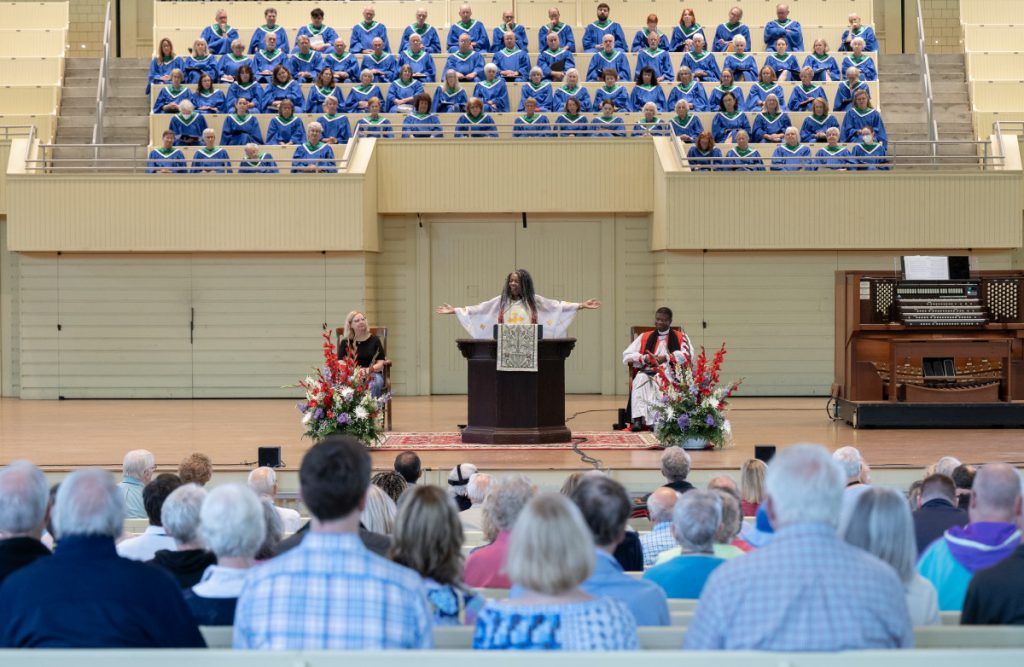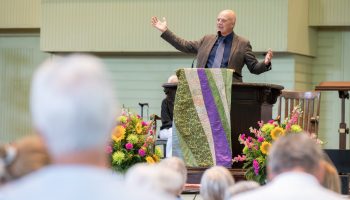
Bishop Cynthia Moore-Koikoi delivers her sermon “The Declaration of Independence: We are Free from Grandma’s Context” during the morning worship service.
“For an organization so resistant to change, I wonder how the church can read the Bible as a guide book,” Bishop Cynthia Moore-Koikoi said at the 9:15 a.m. Friday morning worship service in the Amphitheater.
Her sermon title was “Declaration of Independence: Free to Be a New Creation,” and the scripture reading was Galatians 6:11-18.
She cited Hebrew and Christian scriptures to show where God was doing a new thing. In Isaiah 43 and 44; I Corinthians 15; 2 Corinthians 5; and Revelation 21, the writers declare that a new thing is happening and ask the readers if they can see these changes.
“New life and new creation is declared in both testaments. We who have been moved into a new state, a more faithful state, represent who God dreamed we would become when God knit us in the womb,” Moore-Koikoi said.
She quoted the words of the first verse of “Hymn of Promise,” by Natalie Sneeth.
“In the bulb there is a flower; / In the seed, an apple tree; / In cocoons, a hidden promise: / Butterflies will soon be free! / In the cold and snow of winter / There’s a spring that waits to be, / Unrevealed until its season, / Something God alone can see.”
God is in the business of making us into a new creation, Moore-Koikoi told the congregation, but to live into that new being we have to “fight against being set-point Christians.” When trying to lose weight, the body tries to maintain a certain weight, called a set point.
“If we lose the weight, the body works to put it back on,” she said. “Our metabolism lowers and we crave high-caloric-density foods. We don’t even know we are doing it.”
Likewise, as Christians, we have a certain range of spiritual bondage, she said to the congregation.
“I wish we could remain free, but we have to accept our spiritual independence each and every day,” she said. “Some days the overwhelming craving works to return us to bondage.”
Moore-Koikoi admitted that she did not know if other faith traditions had this problem, but she said that it might be part of the Chautauqua experience.
“We have a Chautauqua experience: We learn something or experience something new and it frees us, liberates us to try something new,” she said. “But because of our set-point, we lose our confidence and enthusiasm we had on the grounds.”
She continued, “You don’t know when the craving to go back (to your set point) will hit you — as soon as you go through the gate, a few weeks later in the Wegman’s check-out line, or something cataclysmic later in the year. I can guarantee it will happen.”
Whether by the power of being in bondage, force of habit or wickedness in the world, there is a force that is trying to pull us back into bondage.
“If you believe anything I have said this week, believe this: I promise you that the force trying to pull you back is not more powerful than the force of the cross,” Moore-Koikoi said. “The force of the cross can overcome your set point.”
Anti-slavery activist and writer Frederick Douglass said this about the tyranny of slavery: “Power concedes nothing without a demand. It never did and it never will.”
“God’s war for your independence is already won,” Moore-Koikoi said. “You are free; it is finished. You don’t have to go to Weight Watchers or take Ozempic. Just cooperate with the grace of God.”
She admitted she has a complicated relationship with the Declaration of Independence as an African American woman. “I lament that Africans and Indigenous people were conscripted to fight but were not included in the document,” she said. “I honor and critique it, celebrate and lament it.”
She continued, “It served as a rallying cry in the fight for independence, but when I am drawn to the set point, I am reminded of the rights God has given.”
Moore-Koikoi urged the congregation to remind themselves of the declaration that God has made: “Write down your freedoms. To remind yourself of your freedom, create mantras like ‘I am a new creation.’ Then do the work.”
Decenter to try to get beyond the set point. Allow others the freedom from bondage that you may have put them in.
“Freedom hasn’t come from your faithfulness, it comes from God,” she said.
She used the hymn, “Great is thy Faithfulness,” to help the congregation use the mantra “Great is God’s faithfulness.”
When you are craving bondage, she told the congregation, remember “morning by morning new mercies,” and one-third of the congregation responded: “Great is God’s faithfulness.” Then she said, “All that is needed,” and another third of the congregation said: “Great is God’s faithfulness.” She closed by saying, “Lord unto us.” The last third of the congregation echoed: “Great is God’s faithfulness.”
The Rev. John Morgan, pastor of the Williamsburg, Virginia, Presbyterian Church, presided. Mary Beth Perrinello, a year-round resident of Westfield, New York, and a volunteer with the Hurlbut Church Meal Ministry, read the scripture. Owen Reyda, 2024 organ scholar, played the prelude, “Adagio,” from Symphony No. 5, by Charles-Marie Widor, on the Massey Memorial Organ. The Motet Choir, under the direction of Joshua Stafford, director of sacred music and the Jared Jacobsen Chair for the Organist, sang “See, I Make All Things New,” music by Alfred V. Fedak and text from Isaiah 43:19-20, 44:3 and Revelation 21:6. Reyda accompanied the choir on the Massey Organ. The postlude was “Toccata,” from Widor’s Symphony No. 5, played by Stafford on the Massey Organ. Support for this week’s services and chaplaincy was provided by the Geraldine M. and Frank E. McElree, Jr. Chaplaincy Fund.




